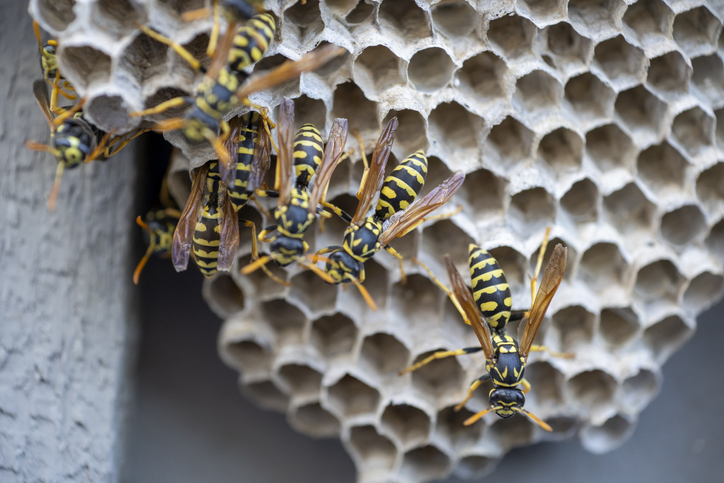Preventing Wasps from Building Nests Near Your Home
How Can I Prevent Wasps From Building Nests Near My Home?
To prevent wasps from building nests near your home, seal entry points, keep your property clean, cover food during outdoor activities, use plants that repel wasps, and eliminate standing water. Regular maintenance and vigilance are key in deterring these pests. For persistent problems, professional services like Orkin can provide safe and effective solutions.
Know Your Enemy: Understanding Wasps
Wasps can be more than just a nuisance; they pose a threat to the comfort and safety of your home environment. Understanding how to prevent these unwelcome guests is crucial in maintaining a peaceful and sting-free household. Here’s your comprehensive guide, brought to you by Orkin, on keeping wasps at bay.
Wasps are more than just a minor annoyance; they can be a significant threat to your safety and comfort. Unlike bees, wasps can sting multiple times, making them a particularly troublesome pest. They are attracted to a variety of things, including sweet foods, proteins, and even the scent of your perfume. Recognizing the signs of a wasp nest early is key to preventing an infestation.

Save $50
on your first recurring service today with code GET50

GET A PERSONALIZED QUOTE
To protect your home from pests, click here for a free pest control estimate. Our Orkin Pros will create a personalized pest treatment plan for your home or business
or Call (866) 249-0292
Types of Wasps
There are several types of wasps, but the most common around homes are paper wasps, yellow jackets, and hornets. Each type has unique behaviors and nesting habits, but all can be aggressive when threatened. Wasps are more active during the day and return to their nests at night. They are particularly attracted to sweet substances and proteins, which is why they are often found around garbage cans, outdoor eating areas, and gardens.
Wasps typically build their nests in sheltered spots with easy access to the outdoors. Common nesting sites include under eaves, in attic rafters, and inside wall voids. The nests are made from chewed wood pulp and saliva, giving them a distinctive papery appearance.
Signs of Infestation
The most obvious sign of a wasp infestation is the presence of a nest. However, seeing an increased number of wasps flying around your property can also indicate a nearby nest. Listen for buzzing sounds in walls or ceilings, which may suggest an interior nest.
Prevention is Better Than Cure
Preventing wasps from building nests near your home is crucial for maintaining a safe and comfortable living environment. Here are some effective strategies:
- Seal Entry Points – Conduct a thorough inspection of your home’s exterior. Look for cracks, crevices, and openings, especially around windows, doors, and rooflines. Sealing these gaps can prevent wasps from entering and nesting in your home.
- Keep It Clean – Wasps are attracted to food sources. Ensure that garbage cans are tightly sealed and disposed of regularly. Clean up food spills immediately, especially outdoors.
- Mind Your Meals – When eating outside, keep food covered. Sweet beverages and proteins can attract wasps, so be vigilant during outdoor activities like barbecues and picnics.
- Landscape with Care – Certain plants can deter wasps. Consider incorporating plants like mint, basil, or geraniums into your garden. These plants not only repel wasps but also add aesthetic value to your outdoor space.
- Water Sources – Wasps need water for survival. Eliminate standing water around your property, including in bird baths, clogged gutters, and plant saucers, to make your home less attractive to them.
- Proper Storage of Food and Waste – Ensure that all food is stored in airtight containers, and waste is disposed of properly. Overripe fruit and sugary substances should be kept out of reach.
- Use of Decoys – Some homeowners find success with wasp decoys. These fake nests can deter wasps, as they are territorial and unlikely to build a nest near another colony.
When Prevention Isn’t Enough
Sometimes, despite your best efforts, wasps can still find a way into your home environment. This is where Orkin steps in. Our trained professionals use safe and effective methods to remove wasp nests, ensuring your home remains a safe haven.
Orkin’s Expertise in Action
At Orkin, we understand the urgency of a wasp problem. Our approach is thorough:
- Inspection – Identifying the type of wasp and the location of the nest.
- Treatment – Employing the most effective methods to remove the nest.
- Prevention – Offering advice and solutions to prevent future infestations.
Why Choose Orkin?
- Expert Knowledge – Our team is trained in wasp behavior and removal techniques.
- Safety First – We prioritize your safety and the environment in our methods.
- Peace of Mind – With Orkin, you can rest assured that your wasp problem is handled professionally.
Don’t let wasps take over your home. Contact Orkin for a consultation and take the first step towards a wasp-free environment. Our team is ready to assist you with all your pest control needs.
Frequently Asked Questions
What attracts wasps to my home?
Wasps are attracted to sweet foods, proteins, and standing water. They also seek sheltered areas for nesting, such as eaves and attic spaces.
Can I prevent wasps from nesting in my garden?
Yes, planting wasp-repelling plants like mint, basil, and geraniums can help deter them from your garden.
How do I seal my home against wasps?
Inspect your home for cracks and openings, especially around windows, doors, and rooflines, and seal them to prevent wasps from entering.
Are there any natural repellents for wasps?
Natural repellents include essential oils like peppermint, eucalyptus, and clove oil. These can be used in sprays around potential nesting sites.
How often should I check for wasp nests?
Regularly inspect your property, especially during spring and summer when wasps are most active.
Can wasp nests damage my property?
Yes, wasp nests can cause structural damage over time, especially if they are inside walls or attic spaces.
What should I do if I find a wasp nest?
It’s safest to contact a professional pest control service like Orkin to remove the nest safely and effectively.
How can I keep wasps away from my outdoor eating areas?
Keep food covered, clean up spills immediately, and consider using decoy nests or natural repellent sprays.
Conclusion
Preventing wasps from building nests near your home requires a combination of diligence, preventive measures, and sometimes professional intervention. By understanding wasp behavior and taking proactive steps like sealing entry points, maintaining cleanliness, using natural deterrents, and eliminating water sources, you can create an environment that’s less attractive to wasps. Remember, while DIY methods can be effective for minor issues, for larger infestations or if you’re unsure, it’s always safer and more effective to call in professionals like Orkin. With their expertise and specialized methods, they can ensure that your home remains a safe and comfortable space for you and your family. Stay vigilant and proactive in your approach, and you can enjoy a wasp-free environment.

Find Your Local Branch
To protect your home from pests, click here for a free pest control estimate. Our Orkin Pros will create a personalized pest treatment plan for your home or business

